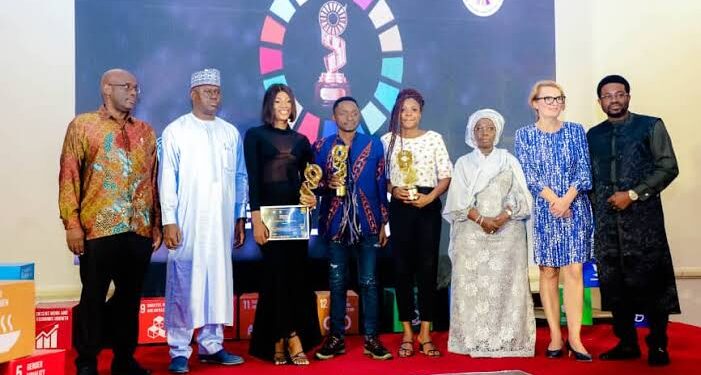Eze Izu Daniel, Saturday night, emerged winner of the 2024 SDGs Short Film Challenge and Awards which took place inside one of the glitzy cinema halls of the Silverbird Cinema, in Central Area, Abuja.
The young film maker’s entry, ‘Wasted’, saw off the stiff contest from 2,249 other entries from across 119 countries, cutting across Europe, America and Asia, to take the diadem position.
The film, which has its theme on the effects of drugs on young people, featured a promising young character who, in the quest to find the right antidote for stage fright, went into drugs, grew from the mild indulgence to the complete addiction that left him so completely dependent, that he lost not just his purpose in life but sanity as well. Essentially, it dwelt on goal 3 of the SDGs which focuses attention on health.
“I feel like the hard work is paying off gradually,” Eze told journalists while reacting to his victory.
Other winners include Road Trip by Victor Eyike/Accelerate TV, 1st runner up, and Oke Okuta by Oke Tolulope.
From the international category, British Passport by Mahmood Pouyandah from Iran won the Best International film version, while the Best Documentary went to Imperishable by Akansha Tiwari from India. Carbon Traces by Stafie Gan from USA won the award for the Best animation, while ‘Alone’, by Stephen Shenboyejo took podium position on Viewers’ Choice.
The choice of ‘Wasted’ as the Challenge grand prize winner was well received both by online viewers and the packed audience at the venue of the event, comprising some of the most credible individuals and groups, local and international. They include Elsie Attafuah, UN Resident/Humanitarian Coordinator a.i, who described the event as a celebration of talents, a celebration of innovation and vision.
Other prominent individuals that graced the eye-catching event are Hon Usman Bashir Zubairu, member, House of Representatives, Gwari Giwa Federal Constituency, who stood in for the Speaker, Rt Hon Tajudeen Abbas.
Hamza Baba; Imran Garba Duba, (SA to the President on Innovation) and Mrs Winifred Shokpeka, FCT Coordinator, NYSC, stood in for the Deputy Speaker, Rt. Hon. Benjamin Okezie Kalu; Minister of Arts, Culture and Creative Economy, Barr Hannatu Musa Musawa and NYSC Director General, Brig-Gen. Y.D. Ahmed respectively. Shaibu Husseini, Ph.D, Executive Director/CEO, the Nigeria Film and Video Censors Board, was represented by Ms. Deborah Malgwi.
The grand finale is the climax of a year-long effort by the Office of the Senior Special Assistant to the President on Sustainable Development Goals, OSSAP-SDGs, the United Nations Information Centre, UNIC, and FreshNEWS Multimedia to engage creative young filmmakers in a global drive to create awareness for Sustainable Development Goals.
As an innovative platform, the SDGs Short Film Challenge is designed to empower young filmmakers to spotlight developmental issues through the lens of sustainability with emphasis on the important need for participants to focus attention in creating short films of no more than 15 minutes, showcasing the challenges and opportunities related to achieving the SDGs.
The films, themed on such development issues as gender inequality, climate change with the films requested to be more than mere artistic expressions hut calls to action through powerful storytelling ability that invites creative filmmakers to engage audiences, provoke critical conversations and inspire tangible action.
In addition, the event is a deliberate attempt by the organizers to highlight the broader significance of youth-driven initiatives in advancing the SDGs spiced up with keynote speeches and interactive sessions designed to inspire young people to take ownership of sustainable development in their communities.
However, unlike the inaugural challenge which garnered 73 entries from across Nigeria, culminating in a grand showcase on International Youth Day, the 2024 edition attracted 2, 250 entries from 119 countries all over the world.
In her keynote address, Senior Special Assistant to the President on Sustainable Development Goals, OSSAP-SDGs, Princess Adejoke Orelope-Adefulire, described the event as a significant one in that it is set to harness the power of the creative industry to, through young minds, evolve a platform for showcasing diverse development issues and provoking action at sorting them out.
“This is why today’s event is so significant. By harnessing the power of film and the creativity of our youth, the SDGs Short Film Challenge has provided a unique platform for amplifying voices, showcasing diverse perspectives, and inspiring action.
Film transcends boundaries, touches hearts, and ignites conversations. Through this medium, we can shine a light on pressing issues, highlight innovative solutions, and catalyse collective action,” she said.
The SSAP-SDGs, who was enthused by the huge number of entries from across the world, expressed with delight that the 2024 edition surpassed all expectations, a factor that indicates how quickly development fire is burning among young people.
The maiden edition of the SDGs Short Film Challenge, launched as a pilot on the International Youth Day in 2023, received an encouraging 73 entries.
This second edition has surpassed all expectations, receiving 2,250 entries from 119 countries—a remarkable testament to the power of this platform to resonate globally.”
Elsie Attafuah, the UN Resident/Humanitarian Coordinator a.i, in her remarks, stated that the SDGs Short Film Challenge is a veritable tool for advocating for the SDGs.
“As much as there are challenges, opportunities also abound in Nigeria. Young people play a central role in using digital technologies and creative industries to address socio-economic challenges.
The fourth chapter of the Pact For The Future adopted by all member states of the UN, of course, including Nigeria, is on ‘Youth and Future Generations’.
“Therefore, this SDGs Short Film Challenge is far more than a film show: It is a vital step towards realizing the full potential of young people in Nigeria, leveraging the veritable platform of the movie and entertainment industry.
“It is an innovative initiative designed to empower young filmmakers to spotlight developmental issues through the lens of sustainability, leverages the story telling power of film to amplify youth voices, foster creativity, and inspire collective action to tackle gender inequality, to address climate change.
These films are more than artistic expressions; they are calls to action toward achieving the global goals.
“This event marks the culmination of a year-long effort by the OSSAP-SDGs, UN Information Centre (UNIC) in Resident Coordinator’s Office and Fresh NEWS to engage young filmmakers as key players in the global drive for sustainable development.” She stated.











